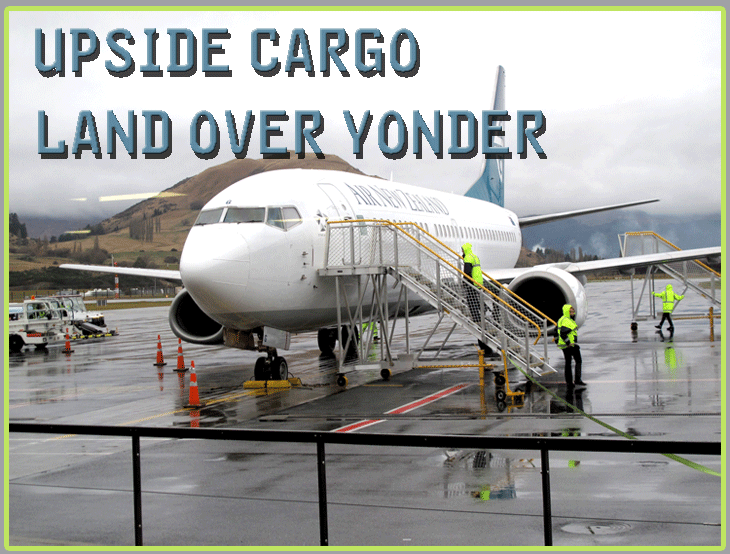
Air New Zealand is pictured at
Shanghai Pudong International Airport as the carrier
assesses a number of Chinese cities as potential destinations
that could be added to the carriers' PVG and HKG services.
Interestingly, adding Chengdu would be a route of 10,505km—slightly
longer than Auckland to Los Angeles.
Despite
global declines in cargo yields, Air New Zealand is
remaining startlingly competitive. In FY 2016,
the carrier saw net profit reach NZ$338m (USD$242m converted
at current conversions rates), an increase of 154 percent
year-on-year. Its distance from global markets saw lower
fuel prices contribute considerably to the gains, but
operating revenue also surged. And, more significantly,
cargo volumes were up 9 percent, yield by 1.6 percent
and revenues by 21 percent with growth particularly
strong on Pacific long-haul services and into Singapore.
Given that many carriers are reporting yield, revenue
and, in some cases, also volume decreases, the results
were outstanding.
Rick Nelson, Air New
Zealand’s General Manager Cargo, said the airline’s
freight business had, like most carriers, been impacted
recently by global declines in cargo yields. But he
insisted that upgrading products rather than cutting
prices and services had helped retain competitiveness.
“Air New Zealand
has remained competitive in the markets,” he said. “Our
diversification of cargo product globally, with a focus
on high quality products and services, through understanding
customers’ needs and developing appropriate solutions,
has helped reduce the potential impact on yields.
“Understanding
customer needs and creating appropriate solutions which
add value will continue to be fundamental to our cargo
success moving forward.”
Of course, the airline
has also benefitted from the economic performance of
its home market, which provides a steady supply of cargoes
for uplift. “New Zealand is a primary producer
of perishable products and innovative manufacturing,”
said Nelson. “New Zealand has a strong reputation
for high quality products and, as a result, we have
seen increased volumes of cargo.
“Equally, as New
Zealand establishes or enhances trade agreements globally,
we see an evolving and growing level of cargo.
“While the economics
of air cargo continue to be put under pressure, the
potential for trade to increase to the benefit of many
countries should have a positive impact on cargo volumes
in the short and long term.”
Air New Zealand has a
fleet of 106 passenger aircraft at present with a committed
investment of around $2.2 billion in new aircraft over
2017 to 2020. Nelson said the introduction of new Boeing
787-9s has enabled capacity increases into key markets,
such as China, further supporting trade to and from
New Zealand.
“A new ULD handling
system, which will shortly go live, is a significant
investment in cargo efficiency and will further differentiate
our Cargo Operations business from competitors and ensure
a seamless import and tranship process for Air New Zealand
customers,” he added.
“Air New Zealand
has also significantly invested in digital technologies,
enhancing online national cargo booking portals and
online support for agents.
“As a result of
our expanding network our global Cargo sales team has
increased in size. We continue to invest in our people
and in strong leadership development.”
The carrier has also
benefitted in the past year from expanding its network
to include Buenos Aires, Ho Chi Minh City, and Houston.
New services have also been announced to Manila and,
in November, flights will resume to Osaka.
“This expansion
of our network has opened up additional direct gateways
to our cargo customers and potential new markets for
importers and exporters in the Pacific Rim,” he
said.
“Air New Zealand
is continually looking at new potential routes or enhancements
to existing routes, and consideration is always given
to the impact these routes would have on cargo. South
East Asia continues to be an area of growth.”
Besides the addition
of new routes, Air New Zealand has also been working
hard to extend its ‘virtual network’ through
strengthened relationships with alliance partners, giving
access to more than 150 different destinations to customers.
This virtual network has also benefitted from “significantly
increased volumes” in the past 12 months, said
Nelson.
“With a good start
and a strong growth documented in 2016, Air New Zealand
is determined to see this through and has made further
investments in digital technologies, enhancing national
online cargo booking portals and online support for
agents.”
Sky King |





